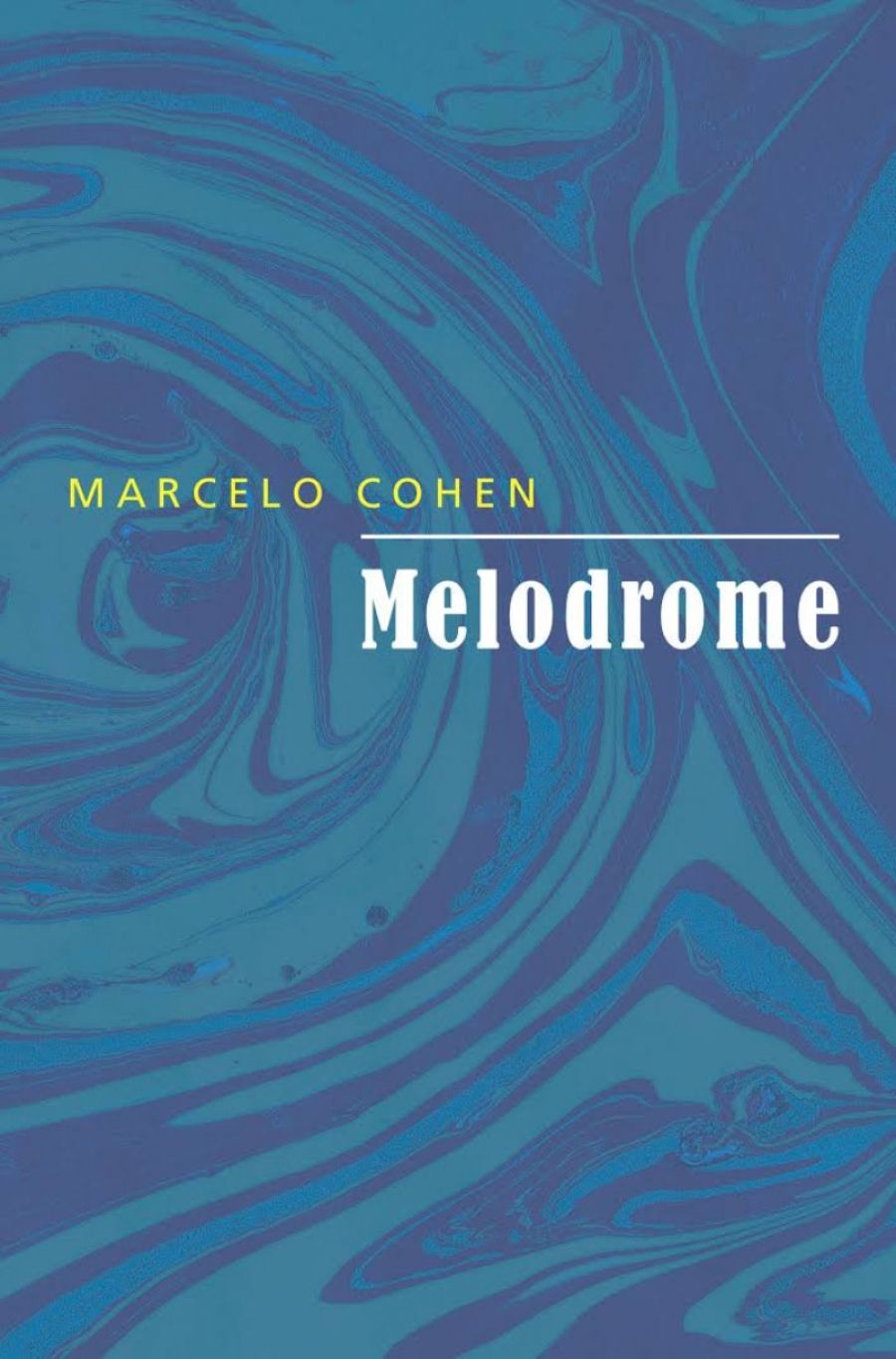
- Free Article: No
- Contents Category: Fiction
- Custom Article Title: Alice Whitmore reviews 'Melodrome' by Marcelo Cohen
- Review Article: Yes
- Online Only: No
- Custom Highlight Text:
‘I didn’t realise I was becoming untranslatable,’ Marcelo Cohen confessed after the publication of his eleventh novel, in an interview with Argentine newspaper Clarín. ‘And when I did realise, it was already too late.’ Given that Cohen is himself a renowned translator – the list of authors he has translated into Spanish ...
- Book 1 Title: Melodrome
- Book 1 Biblio: Giramondo, $24.95 pb, 142 pp, 9781925336771
It took the deft hand of translator-wizard Chris Andrews to break the trance. Andrews, who is best known as the Australian translator of Roberto Bolaño and César Aira, is a poet as well as a translator, and his poetry chops stand him in good stead here: from the very first page, the language of Melodrome is strange and thrilling, thick with onomatopoeia and neologisms. The novel, originally published in 2011 under the title Balada, was the winner of Argentina’s Premio de la Crítica, and constitutes the third title in Giramondo’s Southern Latitudes series. The genre-bending weirdness of Melodrome entirely befits a marginal project like Giramondo’s. This is a short, fast-paced novel that fears no boundaries, drawing from a number of madly intersecting influences to create something alarmingly original: a wildfire of a tale that is part redemptive road trip, part romantic comedy, part oneiric psychodrama, all couched in the vivid and unsettling language of speculative fiction.
Melodrome tells the story of Lerena Dost, a ‘bold’ and ‘inflexible’ career woman, and Suano Botilecue, a disgraced psychoanalyst living a life of repentant asceticism. We meet Suano in the courtyard of the Deluxin guesthouse, where he provides free therapeutic counselling to the homeless. Enter Lerena, who (we soon learn) is Suano’s much-maligned ex-patient-slash-ex-lover. Having suffered a professional downfall of her own, Lerena visits Suano with an unusual proposition: after a chance (or fated?) encounter with a mesmerising woman in a lift, Lerena bought a lottery ticket and won a hefty sum of money; now she wants Suano to help her track down the woman, who just so happens to be the leader of an enigmatic spiritual cult secreted away in the Felinezo Hills. From this improbable starting point, Lerena and Suano embark on a journey riddled with interferences and impasses, which reads at times like the bizarre love child of Lewis Carroll’s Alice in Wonderland and Dante’s Divine Comedy. Cohen’s language, inventively and beautifully reconstructed by Andrews, is by turns rollicking and arresting. At times, the imagery is almost painfully superb: Suano is ‘thin and tall [...] bowed, flexing like a liquorice stick’; two lovers wake up ‘attached to one another like a petal clinging to the fingertip of the hand that has cut a rose’. Lerena and Suano’s sweeping car trips provide some of the novel’s most memorable passages: drifting through a strange rural landscape blemished by industry, they pass factories ‘pissing residual liquids’, small villages ‘like the stools of a constipated state’; elsewhere, ‘crinkled vapours and flimsy clouds pull away from the sky’s grey clay, as if someone were modelling it’.
 Marcelo Cohen (photo via Giramondo Publishing)
Marcelo Cohen (photo via Giramondo Publishing)
The story takes place within a fictional universe called the Panoramic Delta, a dimly futuristic milieu that Cohen has crafted and explored in intricate detail over the course of many years. Conceived as a constellation of interconnected islands, each possessing a distinct culture and way of life, the Panoramic Delta is as fantastical as it is unnervingly familiar. The setting first appeared in Cohen’s short story collection Los acuáticos (2001), and has since taken on a life of its own, gradually swelling in size and complexity. Not quite dystopian, the Panoramic Delta feels almost mundanely escapist, a space for Cohen to conduct gentle experiments of the imagination. Cohen himself has described his writing as ‘sociología fantástica’ – fantastic sociology – and this feels like a fitting term for a genre that bobs somewhere in the waters between fantasy and realism.
As Cohen tells it, he came up with the concept of the Panoramic Delta after reading Christopher Priest’s 1981 science fiction novel The Affirmation. In it, Priest evokes a place called the Dream Archipelago, a fictional setting that reappears in two of his later works. Though Melodrome is unlike The Affirmation in many ways – stylistically, Cohen’s work is unique – the parallels with Priest’s novel feel almost like an homage. Aside from the fact that both are impressive feats of world-building, the plots of both feature catalytic professional and romantic crises, a lottery win, a road trip, and the slow unravelling of a hallucinatory (even schizophrenic?) warping of reality. There are hints, in Melodrome, that the protagonists are enveloped in some kind of fantasy version of reality, some surreality induced by dreaming or madness, and, just like Priest before him, Cohen wields this sense of ambiguity to great effect.
At its heart, though, Melodrome is a tale of love, obsession, and desire. Brief in length but epic in scope, this unusual story is propelled by timeless themes: human failure; metamorphosis; the corrupting and redemptive power of love. These are the poetic anchors that bring Cohen’s novel closest to the ballad – or balada – of its title.


Comments powered by CComment